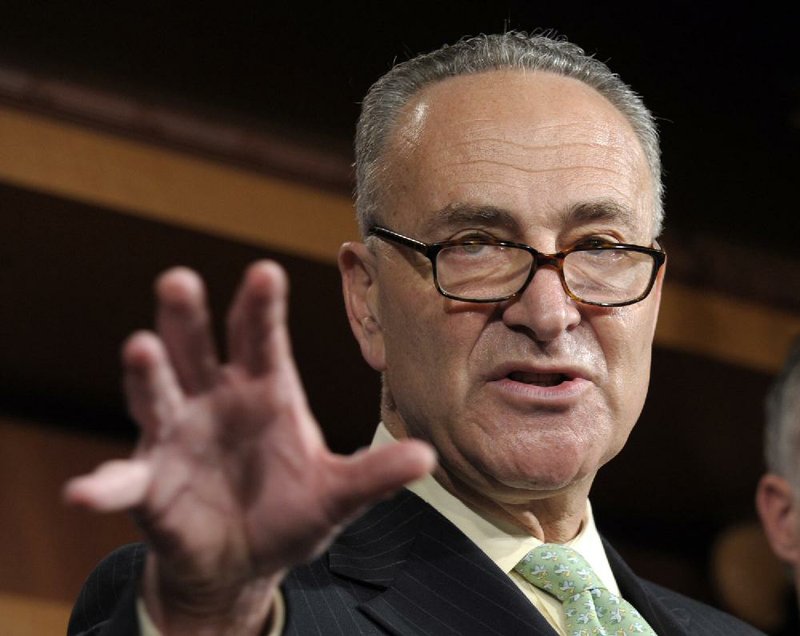WASHINGTON - Big business and labor have struck a deal on a new low skilled-worker program, labor and Senate officials said Saturday.
The agreement was reached in a phone call late Friday night with AFL-CIO President Richard Trumka,U.S. Chamber of Commerce President Tom Donohue and Democratic Sen. Chuck Schumer of New York, who’s been mediating the dispute.
The deal resolves disagreements over wages for the new workers and which industries would be included. Those disputes had led talks to break down a week ago, throwing into doubt whether Schumer and seven other senators crafting a comprehensive bipartisan immigration bill would be able to complete their work as planned.
The deal must still be approved by the other senators working with Schumer, including Republicans John McCain of Arizona and Marco Rubio of Florida, but that’s expected to happen, according to a person with knowledge of the talks who spoke on condition of anonymity. With the agreement in place, the senators are expected to unveil their legislation the week of April 8. Their measure would secure the border, crack down on employers, improve legal immigration and create a 13-year pathway to citizenship for the millions of illegal aliens already in the U.S.
Immigration legislation is a major second-term priority of President Barack Obama’s and would usher in the most dramatic changes to the nation’s faltering immigration system in more than two decades.
“The strength of the consensus across America for just reform has afforded us the momentum needed to forge an agreement in principle to develop a new type of employer visa system,” Trumka said in a statement late Saturday. “We expect that this new program, which benefits not just business, but everyone, will promote long overdue reforms by raising the bar for existing programs.”
Schumer said: “This issue has always been the deal-breaker on immigration reform, but not this time.”
But the complexity of the matter was highlighted when one member of the business community said Saturday afternoon that the lead negotiators on the business side had not seen written details of a final agreement and cautioned that declaring the matter resolved was premature.
“Business groups are still waiting to see the details. I don’t know where it’s coming from,” the business official said, speaking on the condition of anonymity because of the sensitivity of the negotiations. “I don’t want to blow this up at all, but to say everyone’s signed off on this is getting ahead of ourselves.”
Members of the Senate working group also declined to confirm the deal. Alex Conant, a spokesman for Rubio wrote on his Twitter account, “Senate negotiators are making good progress on immigration reform, but we’re not done yet.”
A spokesman for McCain, declined to comment Saturday.
The AFL-CIO and the Chamber of Commerce, longtime antagonists over guest-worker programs, had been fighting over wages for tens of thousands of low skilled workers who would be brought in under the new program to fill jobs in construction, hotels and resorts, nursing homes and restaurants, and other industries.
Under the emerging agreement, a new “W” visa program would go into effect beginning April 1, 2015, according to an AFL-CIO fact sheet.
In year one of the program, 20,000 workers would be allowed in; in year two, 35,000; in year three, 55,000; and in year four, 75,000. Ultimately the program would be capped at 200,000 workers a year, but the number of visas would fluctuate, depending on unemployment rates, job openings, employer demand and data collected by a new federal bureau pushed by the labor movement as an objective monitor of the market. One-third of all visas in any year would go to businesses with under 25 workers.
A “safety valve” would allow employers to exceed the cap if they can show need and pay premium wages, but any additional workers brought in would be subtracted from the next year’s cap.
The workers could move from employer to employer and would be able to petition for permanent residency after a year, and ultimately seek U.S. citizenship. Neither is possible for temporary workers now.
The new program would fill needs employers say they have that are not currently met by U.S. immigration programs. Most industries don’t have a good way to hire a steady supply of foreign workers because there’s one temporary visa program for low-wage nonagricultural workers but it’s capped at 66,000 visas per year and is only supposed to be used for seasonal or temporary jobs.
Business has sought guest-worker programs in a quest for a cheaper work force, but labor has opposed the programs because of concerns over working conditions and the effect on jobs and wages for U.S. workers. The issue helped sink the last major attempt at immigration overhaul in 2007, which the AFLCIO opposed partly because of guest-worker provisions, and the flare-up earlier this month sparked concerns that the same thing would happen this time around. Agreement between the two traditional foes is one of many indications that immigration reform has its best chance in years in Congress this year.
After apparent miscommunication earlier this month between the AFL-CIO and the Chamber of Commerce on the wage issue, the deal resolves it in a way both sides are comfortable with, officials said.
Workers would earn actual wages paid to American workers or the prevailing wages for the industry they’re working in, whichever is higher. The Labor Department would determine prevailing wage based on customary rates in specific localities, so that it would vary from city to city.
Schumer called White House Chief of Staff Denis McDonough on Saturday to inform him of the deal, the person with knowledge of the talks said. The three principals in the talks - Trumka, Donohue and Schumer - agreed they should meet for dinner soon to celebrate, the person said.
However, in a sign of the delicate and uncertain negotiations still ahead, Rubio sent a letter Saturday to Judiciary Committee Chairman Patrick Leahy, D-Vt., calling for a deliberate hearing process on the new legislation and cautioning against a “rush to legislate.” Rubio and a number of other Republicans are striking a tricky balance as they simultaneously court conservative and Hispanic voters on the immigration issue.
Separately, the new immigration bill also is expected to offer many more visas for high-tech workers, new visas for agricultural workers, and provisions allowing some agricultural workers already in the U.S. a speedier path to citizenship than that provided to other illegal immigrants, in an effort to create a stable agricultural workforce.
Information for this article was contributed by Erica Werner of The Associated Press and by David Nakamura of The Washington Post.
Front Section, Pages 1 on 03/31/2013


